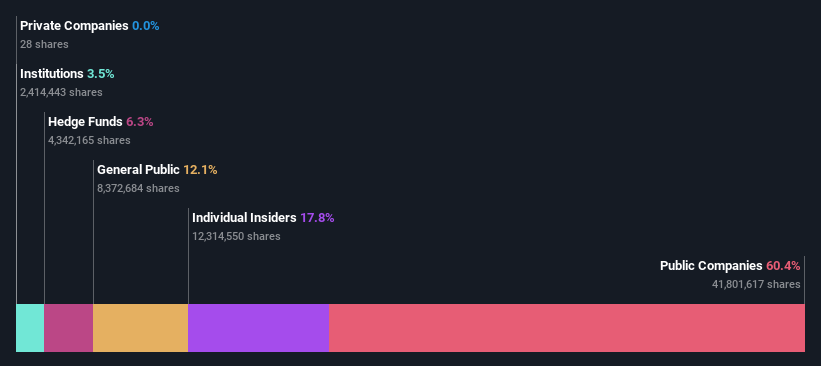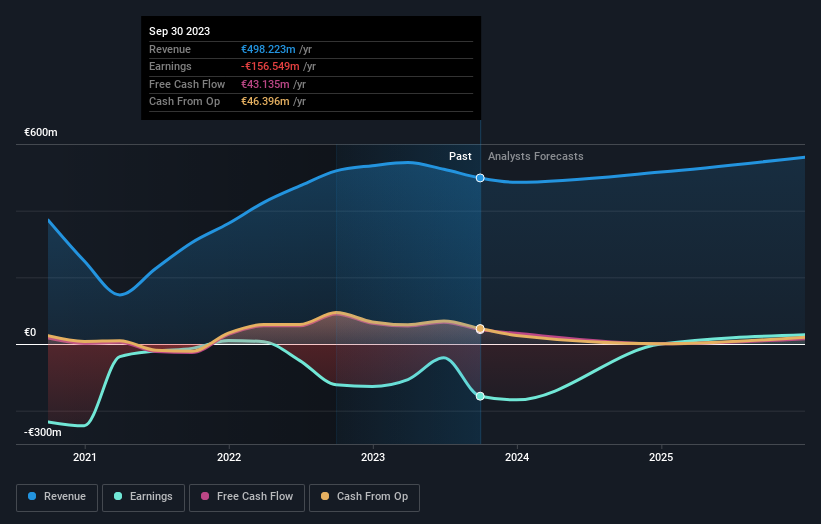- United States
- /
- Interactive Media and Services
- /
- NasdaqGS:TRVG
Public companies who hold 60% of trivago N.V. (NASDAQ:TRVG) gained 14%, insiders profited as well

Key Insights
- The considerable ownership by public companies in trivago indicates that they collectively have a greater say in management and business strategy
- Expedia Group, Inc. owns 60% of the company
- Insider ownership in trivago is 18%
Every investor in trivago N.V. (NASDAQ:TRVG) should be aware of the most powerful shareholder groups. And the group that holds the biggest piece of the pie are public companies with 60% ownership. In other words, the group stands to gain the most (or lose the most) from their investment into the company.
Public companies gained the most after market cap touched US$181m last week, while insiders who own 18% also benefitted.
Let's delve deeper into each type of owner of trivago, beginning with the chart below.
See our latest analysis for trivago

What Does The Institutional Ownership Tell Us About trivago?
Institutions typically measure themselves against a benchmark when reporting to their own investors, so they often become more enthusiastic about a stock once it's included in a major index. We would expect most companies to have some institutions on the register, especially if they are growing.
Less than 5% of trivago is held by institutional investors. This suggests that some funds have the company in their sights, but many have not yet bought shares in it. So if the company itself can improve over time, we may well see more institutional buyers in the future. We sometimes see a rising share price when a few big institutions want to buy a certain stock at the same time. The history of earnings and revenue, which you can see below, could be helpful in considering if more institutional investors will want the stock. Of course, there are plenty of other factors to consider, too.

It would appear that 6.3% of trivago shares are controlled by hedge funds. That's interesting, because hedge funds can be quite active and activist. Many look for medium term catalysts that will drive the share price higher. Looking at our data, we can see that the largest shareholder is Expedia Group, Inc. with 60% of shares outstanding. With such a huge stake in the ownership, we infer that they have significant control of the future of the company. With 14% and 6.3% of the shares outstanding respectively, Rolf Theo Schromgens and Par Capital Management, Inc. are the second and third largest shareholders. Rolf Theo Schromgens, who is the second-largest shareholder, also happens to hold the title of Top Key Executive.
Researching institutional ownership is a good way to gauge and filter a stock's expected performance. The same can be achieved by studying analyst sentiments. There are a reasonable number of analysts covering the stock, so it might be useful to find out their aggregate view on the future.
Insider Ownership Of trivago
The definition of company insiders can be subjective and does vary between jurisdictions. Our data reflects individual insiders, capturing board members at the very least. Management ultimately answers to the board. However, it is not uncommon for managers to be executive board members, especially if they are a founder or the CEO.
Insider ownership is positive when it signals leadership are thinking like the true owners of the company. However, high insider ownership can also give immense power to a small group within the company. This can be negative in some circumstances.
It seems insiders own a significant proportion of trivago N.V.. It has a market capitalization of just US$181m, and insiders have US$32m worth of shares in their own names. We would say this shows alignment with shareholders, but it is worth noting that the company is still quite small; some insiders may have founded the business. You can click here to see if those insiders have been buying or selling.
General Public Ownership
The general public, who are usually individual investors, hold a 12% stake in trivago. While this size of ownership may not be enough to sway a policy decision in their favour, they can still make a collective impact on company policies.
Public Company Ownership
We can see that public companies hold 60% of the trivago shares on issue. This may be a strategic interest and the two companies may have related business interests. It could be that they have de-merged. This holding is probably worth investigating further.
Next Steps:
I find it very interesting to look at who exactly owns a company. But to truly gain insight, we need to consider other information, too. For instance, we've identified 1 warning sign for trivago that you should be aware of.
Ultimately the future is most important. You can access this free report on analyst forecasts for the company.
NB: Figures in this article are calculated using data from the last twelve months, which refer to the 12-month period ending on the last date of the month the financial statement is dated. This may not be consistent with full year annual report figures.
New: Manage All Your Stock Portfolios in One Place
We've created the ultimate portfolio companion for stock investors, and it's free.
• Connect an unlimited number of Portfolios and see your total in one currency
• Be alerted to new Warning Signs or Risks via email or mobile
• Track the Fair Value of your stocks
Have feedback on this article? Concerned about the content? Get in touch with us directly. Alternatively, email editorial-team (at) simplywallst.com.
This article by Simply Wall St is general in nature. We provide commentary based on historical data and analyst forecasts only using an unbiased methodology and our articles are not intended to be financial advice. It does not constitute a recommendation to buy or sell any stock, and does not take account of your objectives, or your financial situation. We aim to bring you long-term focused analysis driven by fundamental data. Note that our analysis may not factor in the latest price-sensitive company announcements or qualitative material. Simply Wall St has no position in any stocks mentioned.
About NasdaqGS:TRVG
trivago
Operates a hotel and accommodation search platform in the United States, Germany, the United Kingdom, Canada, Japan, and internationally.
Flawless balance sheet and undervalued.
Similar Companies
Market Insights
Community Narratives



